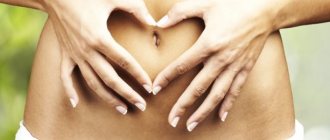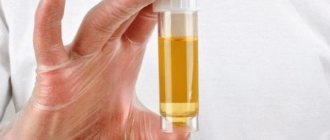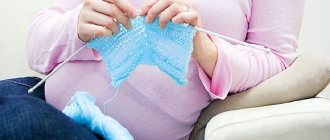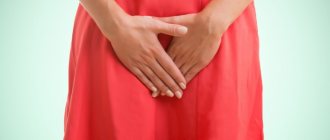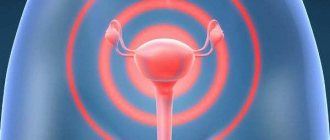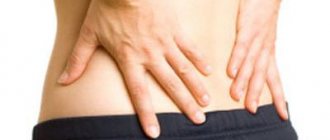Signs of pregnancy
Often women listen to intuition or invent signs for themselves. Can an expectant mother feel something during early pregnancy?
I probably know everything about the first sign – nausea in the morning and even vomiting. You may want to hug your porcelain friend several times a day, but too frequent toxicosis requires treatment.
The second most common symptom is weakness, drowsiness and general poor health.
It would seem that everything is normal with your health, you sleep well and are not overtired, but you are constantly tempted to lie down or sleep. If there are no other explanations for this, then the reason may be pregnancy.
Weakness is also typical when menstruation arrives.
When a woman is early in her pregnancy, and it is still too early for her period to be missed, she often feels as if she has caught a cold. This happens due to the fact that immunity has decreased, the body is weakened and fights various viruses worse. A woman may feel either cold or hot, or really get a little sick.
Frequent little runs. This is normal when pregnancy occurs, but the same symptoms occur in diabetes.
Among the pleasant changes is an increase in breast size. True, the mammary glands become more sensitive and painful when touched.
This phenomenon is common during PMS and ovulation. The breasts swell within a week after conception, and if the nipples also become darker, but you are really in the early stages.
Among the early signs of conception are changes in the perception of smells and strange taste preferences. A girl may develop intolerance to certain scents and even feel worse.
A sensitive sense of smell is accompanied by a change in tastes in food. Not everyone necessarily wants salty and sour, but fish mixed with ice cream or other non-standard food combinations may well be.
A lot of saliva in the mouth means pregnancy. This is a rather unpleasant sign of early fertilization.
Because of it, girls quickly lose extra pounds; frequent swallowing of large amounts of saliva leads to inflammatory processes in the stomach.
Early pregnancy can easily lead to PMS.
What kind of chest pain is considered normal?
Only a specialist can reliably determine whether chest pain is normal during pregnancy. It’s worth consulting with him once again to rule out a pathological cause of the discomfort.
If your chest aches and there is a pulling sensation, then this condition is usually normal. The degree of severity may vary.
Itching in the nipple area, burning sensation, and tingling may also be normal. These signs may accompany the production of colostrum. In this case, it is especially important to maintain personal hygiene.
How to reduce pain?
If we are not talking about pathologies and pain is a normal consequence of the restructuring of the body, then this still does not mean that it must be endured throughout the pregnancy. There are ways to help reduce discomfort:
- Daily chest massage will disperse blood through the vessels and prevent the formation of seals and venous mesh.
- In moments of exacerbation of pain, you can wipe your chest with pieces of ice.
- Do not wear tight underwear, as contact with it will intensify the pain.
- Drink a lot of water (dehydration leads to dry skin), make sure there is enough protein, minerals, and vitamins in your diet.
Pregnant women are prohibited from choosing painkillers (especially Aspirin) on their own. If the pain is too severe, you should inform your doctor. Based on how the pregnancy is progressing and the woman’s general condition, the specialist will select the appropriate drug (for example, it could be Paracetamol, ketoprofen ointment, natural creams).
What to do if your breasts hurt during pregnancy?
If your breasts hurt during pregnancy, you should see a specialist. The doctor will examine the condition of the mammary glands and perform palpation. Based on such an examination, it will be possible to say whether the changes occurring are normal or whether it is worth undergoing additional examination if any pathology is suspected.
Breast pain brings discomfort, reduces the quality of life, and negatively affects the psycho-emotional state. There are several ways that can help get rid of pain or reduce its occurrence to a more comfortable level:
- Be sure to wear a bra. Wearing it is important for good blood circulation and maintaining breast shape. If blood circulation is impaired, there is a risk of blockage of the milk ducts. Such violations lead to lactostasis and mastitis. If the sensitivity of your nipples is increased, then you should try not taking off such underwear at night. This option is feasible provided you have comfortable underwear that does not interfere with healthy sleep.
- Changing your bra. During pregnancy, breasts grow, so you need underwear of the appropriate size. Since the sensitivity of the nipples is increased, you should carefully consider the choice of fabric - lace cups will cause discomfort. When colostrum is released, it is worth purchasing a special bra for a nursing mother, in which you can change breast pads. This not only reduces pain, but is also important for personal hygiene purposes.
- Breast massage. To do this, use a terry mitten. Massaging your breasts is beneficial from the very first days of pregnancy. This is an excellent prevention of the appearance of stretch marks and provokes a slight hardening of the nipples, which will provide a positive effect during breastfeeding. If the sensations are not too painful, then the nipples can be slightly pulled out and twisted. Such manipulations should be carried out after the hygiene procedure.
- Use hypoallergenic breast hygiene products. During pregnancy, the body changes, so even ordinary soap and the usual shower gel can cause irritation and dry out already sensitive skin.
- Do special exercises for the chest. Regular practice can reduce pain and maintain the shape and firmness of your breasts.
- Hardening. It can be carried out from the second trimester. To harden the chest, you can resort to air baths and contrasting wet rubdowns. In this case, exposure to too low or high temperatures should not be allowed. Such procedures are useful for normalizing blood flow, maintaining breast shape and good skin condition. Hardening is an excellent prevention of mastitis.
Chest pain during pregnancy is usually a sign of changes occurring in the body. It is necessary to distinguish normal painful manifestations from pathological signs of various diseases. If you have the slightest doubt, you should consult a doctor. You can get rid of chest pain or reduce its severity using several techniques.
Pain during frozen pregnancy
If the fetus stops developing, the amount of progesterone in the woman’s body will sharply decrease. This leads to many changes. For example, during a frozen pregnancy, the pain in the chest suddenly stops, and the glands themselves seem to fall off (“deflate”) - they become very soft and lose their shape.
Breast changes in themselves do not indicate a frozen pregnancy. In addition to this symptom, other warning signs should appear:
- Purulent and bloody discharge from the genitals.
- Weakness, nausea, vomiting (more intense than with toxicosis).
- A sharp increase in body temperature.
- Cramping pain in the lower abdomen.
If such symptoms appear, you should immediately seek help from a doctor. Of course, it is impossible to resurrect a child during a frozen pregnancy, but the decomposing fetus must be removed as early as possible so that complications do not begin that threaten the woman’s life.
What changes happen first?
Unusual sensations in the mammary glands may be the first to signal pregnancy. They can even be stronger than PMS, which in some people is very pronounced, which sometimes causes anxiety and a desire to run to a mammologist.
If a woman is already aware of the changes awaiting her, then she will probably be interested in the question: do breasts hurt at the first signs of pregnancy? After all, everyone knows that sensation can be a symptom of dysfunctional development. But in this case, it is rather an indicator of health and means that the mammary glands are preparing to perform their main function.
Increased sensitivity
The breasts show the first signs of pregnancy early. Its size remains the same for now, but the skin becomes very sensitive. Any contact causes trembling and rejection, and as the situation develops, pain is felt.
After conception, the concentration of female hormones in the body increases significantly. The body is unaccustomed to such a volume of substances. Therefore, the reaction of the mammary glands can be quite acute. It also depends on the volume of estrogen and progesterone. Those who have a very high level call the sensations in the chest difficult to bear. For others, they are comparable to PMS symptoms. But in any case, the sensitivity of the mammary glands will increase, even the touch of underwear to the skin will become noticeable.
Soreness
Chest pain is an unpleasant but inevitable sign of pregnancy.
Its root cause is a change in hormonal balance, but not only. The presence of substances is necessary for the breast to ensure milk production. Each gland consists of lobules, connective tissue and ducts through which it will go to the nipples. A woman feels that her breasts are swollen, a sign of pregnancy at first can be perceived as premenstrual. Under the influence of hormones, blood flows to all areas, due to which the blood vessels stretch. This means increased stress on the nerve roots, which becomes the direct cause of pain. The feeling gradually leaves the woman as pregnancy progresses, but it is quite strong at the beginning, until the body has adapted to the new state. During this same period, some discover that they have hot breasts, a sign of pregnancy that can be frightening, since it does not occur in everyone. This is caused by an increase in body temperature, sometimes characteristic of the initial phase of the condition. But you need to be careful, since pregnancy does not prevent the occurrence of inflammation in the mammary glands, which causes the symptom. The skin turns red and the pain intensifies.
Size matters
Another manifestation of the new situation is that the breasts have enlarged; a sign of pregnancy becomes visible by about 4 weeks.
A woman discovers that her underwear, which was recently worn, has become tight. This is natural due to the expansion of the milk lobules caused by hormones. Food for the unborn baby is formed in them. A woman will also notice how her breasts become fuller; a sign of pregnancy is indicated by the fact that they become heavier, firmer to the touch, and dense. It seems that the glands are already filled with fluid, although in fact, there is nothing like that yet.
Itching
Some people, while expecting a baby, feel that their breasts are itching (a sign of pregnancy is noted less frequently than others, but is due to the same reasons). Itching is caused by an increase in the size of different parts of the mammary glands. Their skin stretches and loses some collagen. In the future, this may manifest itself by the appearance of characteristic non-disappearing marks on it. And don’t forget about the role of hormones in the process. Their growth can cause an allergy-like reaction, but soon the body gets used to it, and the desire to itch disappears by the first third of the term.
Spider veins
Visible veins on the chest as a sign of pregnancy are observed in most expectant mothers. This should be “blamed” on progesterone, without which it is impossible to carry a fetus to term. The hormone provokes an increase in the size of glandular tissue, which would not have occurred without the participation of blood vessels. Through them, blood is directed to the cells, its quantity increases. Naturally, the routes to the tissues, that is, the veins, also expand. Their walls stretch, shining through the skin.
Vascular tissue may also become visible on the face. But neither there nor on the chest is it dangerous or painful. The appearance of the skin will be restored after childbirth.
Leather
Another manifestation that did not exist before is acne on the chest. The sign of pregnancy is again caused by an increase in progesterone. In addition to its inevitable beneficial effect on the body of the expectant mother, it provokes an increase in the greasiness of the epidermis. There are many glands that produce sebum on the chest and face. Since the first one comes into contact with clothing, there is a greater chance of rashes appearing there.
Poor nutrition can also play a role in the occurrence of pimples. Pregnant women develop an addiction to foods that clog pores and increase sebum production: sweet, spicy, salty.
